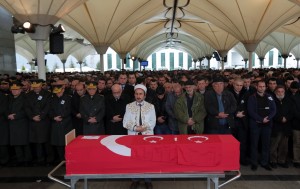
ANKARA, Turkey — Turkey’s air force hit Kurdish rebel targets in northern Iraq on Monday, hours after a suicide car bombing in the capital killed 37 people and heightened tensions with the militants.
Nine F-16s and two F-4 jets raided 18 positions of the Kurdistan Workers’ Party, or PKK, in northern Iraq, including the Qandil mountains where the group’s leadership is based, the state-run Anadolu Agency reported. Ammunition depots, bunkers and shelters were among the targets hit.
Anadolu, citing unnamed security sources, said four people suspected of direct links to the bombing were detained in the southeastern city of Sanliurfa on Monday. The report did not say in what way they were suspected of involvement. Police, meanwhile, carried out raids in the southern city of Adana, detaining 38 suspected PKK rebels, the agency reported. Fifteen suspected Kurdish militants were also detained in Istanbul, Anadolu said.
Health Minister Mehmet Muezzinoglu said three more people died overnight from wounds suffered in the Sunday night’s suicide attack that targeted buses and people waiting at bus stops in the heart of Ankara. Around 125 people were wounded in the blast, with 71 people still hospitalized. Of those, 15 were in serious condition.
A senior government official told The Associated Press that authorities believe the attack was carried out by two bombers — one of them a woman — and was the work of Kurdish militants. He spoke on condition of anonymity because the investigation was continuing.
It was the second deadly attack blamed on Kurdish militants in the capital in the past month and President Recep Tayyip Erdogan vowed to bring “terrorism to its knees.”
On Feb. 17, a suicide car-bombing in the capital targeted buses carrying military personnel, killing 29 people. A Kurdish militant group, which is an offshoot of the PKK, claimed responsibility.
Turkey is grappling with a host of issues, including renewed fighting with Kurdish rebels, tensions with a Syrian Kurdish militia group which is affiliated with the PKK, threats from the Islamic State group and a Syrian refugee crisis.
About 210 people have died in five suicide bombings in Turkey since July that were blamed either on the Kurdish rebels or the Islamic State group.
“All five attacks are linked to the fallout of the Syrian civil war,” said Soner Cagaptay, a Turkey expert at the Washington Institute in emailed comments. “Ankara’s ill-executed Syria policy … has exposed Turkey to great risks.”
“The question, unfortunately, is not if there will be a terror attack again, but when the next attack will be,” Cagaptay said.
Sunday’s blast came as Turkey’s security forces were preparing to launch large-scale operations against militants in two mainly Kurdish towns after authorities imposed curfews there, prompting some residents to flee. The operation in the town of Nusaybin, on the border with Syria, began on Monday, Anadolu reported. Tanks have also been deployed at the town of Yuksekova, near the border with Iraq, but it wasn’t immediately clear when the offensive there would start.
Authorities on Monday announced another curfew, to go into effect at 2100 GMT (5 p.m. EDT) in the city of Sirnak, near the border with Iraq, signaling that the military was also preparing to battle Kurdish militants there.
Turkey has been imposing curfews in several flashpoints in the southeast since August to root out militants linked to the PKK, who had set up barricades, dug trenches and planted explosives. The military operations have raised concerns over human rights violations and scores of civilian deaths. Tens of thousands of people have also been displaced by the fighting.
Last week, Turkey’s military ended a three-month operation against the militants in the historic Sur district of Diyarbakir — the largest city in the country’s mostly Kurdish southeast. On Sunday, authorities eased the curfew in some streets and one neighborhood of Sur, but the siege over the district’s main areas was still in place.
The PKK has been designated a terror organization by Turkey, the U.S. and the European Union. A fragile peace process between the PKK and the Turkish state collapsed in July, reigniting a battle that has cost tens of thousands of lives since 1984.
As Turkey on Monday began to hold funeral services for at least 17 of the people who lost their lives, details emerged about some of the victims, which included the father of Galatasaray soccer team player Umut Bulut.
Anadolu said the player’s father, Kemal Bulut, had watched Galatasaray play Ankara-based team Genclerbirligi in the city — after visiting his son at his hotel — and was returning home when the explosion occurred. Umut Bulut had returned to Istanbul in the evening unaware that his father had been caught up in the blast and learnt of his father’s death as he prepared to start training on Monday.
Police officer Nevzat Alagoz, who also perished in the blast, was waiting for a bus to take him home after policing the game, Anadolu reported.
Another victim, Ozan Akkus, a 19-year-old engineering student, had lost his close friend in deadly twin suicide bombings that targeted a peace rally in the capital in October, Hurriyet newspaper said.
Soon after Sunday’s blast, Ankara residents rushed to hospitals and morgues for news of missing loved ones.
Ridvan Baskiran said he went to several hospitals searching for his cousin, Kubra Pekgenc, who was working at a mall near the blast scene.
“We kept trying to call her, but it was ringing busy,” Baskiran said. “We went around from hospital to hospital and we finally found her. She had brain surgery.”




